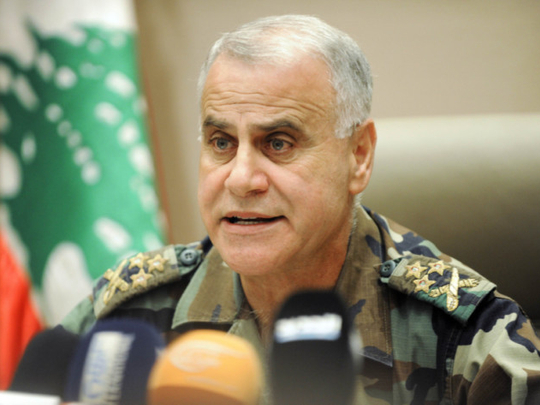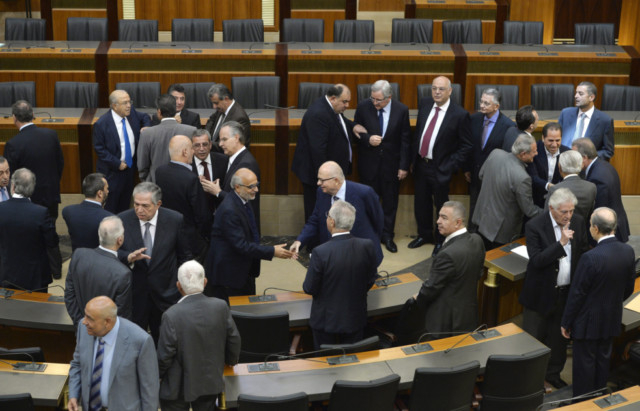
Beirut: Islamic State of Iraq and the Levant (Isil) insurgents who seized a Lebanese border town this month planned to turn Lebanon into another Iraq by unleashing sectarian war between Sunnis and Shiites that would have endangered the nation’s very existence, the army commander said.
General Jean Kahwaji said that radical Islamists on the march in Iraq and Syria still posed a “great threat” to Lebanon, which was torn apart by a 1975-90 civil war and has been badly buffeted by the Syrian conflict.
“The army hit them and continues to, smashing their plan,” said Kahwaji, 37 of whose soldiers were either killed or captured in the battle for the border town of Arsal. “But this does not mean that the story is over,” he said.
“They might think of another plan and try another time to cause Sunni-Shiite strife,” said Kahwaji, 60.
The August 2 attack marked the most serious spillover to date of Syria’s three-year-old civil war into Lebanon and the first time a foreign invader has taken Lebanese territory since the Israeli regime entered the south during its 2006 war with Hezbollah.
Battle-hardened in Syria, the insurgents were members of radical groups including Isil, which has redrawn the borders of the Middle East by seizing territory in Syria and Iraq. The group’s advance has accelerated since it seized the Iraqi city of Mosul in June.
Dozens of the militants were killed in Arsal during a five-day battle with the Lebanese army, according to army estimates. The militants withdrew into the mountainous border zone last Thursday, taking with them 19 captive soldiers.
Kahwaji, dressed in military fatigues, said the Islamists’ aim had been to turn the Sunni Muslim town of Arsal into a bridgehead from which to advance on surrounding Shiite villages, igniting a sectarian fire storm he said would have destroyed Lebanon.
“The strife in Iraq would have moved to Lebanon — 100 per cent,” said Kahwaji, a Maronite Christian.
He said he was basing his assessment on the confessions of an Islamist commander whose detention on August 2 was the immediate trigger for the battle. The commander, Emad Juma, had been “fine-tuning” the plan at the time of his arrest, Kahwaji said.
Juma, 30, was a member of the Nusra Front, Al Qaida’s affiliate in the conflict, but had recently switched allegiance to Isil. He had previously worked as a purveyor of dairy products, Kahwaji said.
Militant cells
His confessions had led to the arrest of a number of militant cells in different parts of Lebanon, he added.
“Would there have remained a state? It is a battle for the survival of the Lebanese entity,” Kahwaji said.
Tensions between Lebanese Shiites and Sunnis are already running high, exacerbated by the role played by the powerful Shiite group Hezbollah fighting alongside President Bashar Al Assad’s forces in Syria.
Lebanese Sunnis have broadly been supportive of the uprising against Al Assad, a member of the Alawite sect, which is an offshoot of Shiite sect. Lebanon is also now home to an estimated 1.6 million Syrian refugees, most of them Sunnis.
Though its arsenal is more powerful than the Lebanese army’s, Hezbollah stayed out of the Arsal battle, wary of wider sectarian strife in a country already hit by suicide bombings, gun battles and rocket attacks linked to the Syrian war.
The arrival of Isil fighters waving the group’s black flag on the northeastern border triggered panic in a country that is home to many religious groups at risk from a movement that has beheaded and crucified its opponents.
Kahwaji said: “If the world and the people give up, then the black flag will arrive in Lebanon. But the people are with the army and they won’t let them arrive.”
The army has been crucial to holding the Lebanese state together since the civil war. It recruits from across the religious spectrum and is more widely trusted than other security agencies that have a more sectarian character.
Outside Kahwaji’s office at the Ministry of Defence in the hills outside Beirut, where he spoke this week, a cartoon shows a soldier carrying a map of Lebanon on his back.
The Arsal crisis rallied all of Lebanon’s main leaders, including Sunni politician Sa’ad Hariri, around the army.
Kahwaji described Hariri’s backing as crucial. He “sensed the degree of danger to Lebanon”, he said.
Hariri returned to Lebanon on Friday for the first time since 2011, ending his self-imposed exile following the downfall of his government in order to buttress the moderate camp against radicals who have gained ground during his absence.
He brought with him a $1 billion (Dh3.67 billion) grant from his regional patron Saudi Arabia — aid designed to help the Lebanese security forces fight Isil militants. “He was obliged to return to fill the [Sunni leadership] vacuum,” Kahwaji said.
The Saudi aid comes on top of a previous pledge of $3 billion in military aid from Riyadh. The Beirut government has asked France to accelerate the delivery of weapons due to be procured with that grant.













